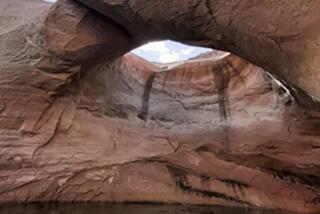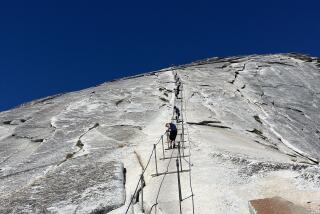Editorial: Pitfalls of Utah’s arch-swinging thrill-seekers
- Share via
There are many ways to enjoy nature. Hiking and camping amid peaceful and lightly traveled backcountry. Hunting and fishing. Off-road cycling or bouncing around in all-terrain vehicles. Now we can add swinging from ropes attached to timeless sandstone formations, which apparently has become a thing in Utah.
Not all of Utah’s famous arches are in Arches National Park, where federal regulations bar activities — including rappelling — that could damage the delicate and awe-inspiring natural bridges. But just south of the park and west of Moab, on what until May had been state land, thrill-seekers have been bolting ropes to the massive Corona Arch and swinging from it in adrenaline-pumping and occasionally bloody 110-foot guided falls. A niche sport to say the least — and in an era when anyone with a camera and access to YouTube can catch 15 minutes of fame, the stunt has caught on. One video posted two years ago has been viewed nearly 24 million times.
So many people have sought to swing from the arch that last year Utah barred commercial extreme-travel firms from the site. In May, the federal Bureau of Land Management took control of the area as part of a land swap in which the state received oil-rich federal acreage in eastern Utah. The bureau also inherited the free-swingers and a controversy growing out of complaints about excessive crowds and noise, and potential damage to the federally protected land. Now it is contemplating banning rope swinging for two years as it conducts an environmental review to figure out how best to manage the new lands.
That’s a good approach. The rope-swinging is dangerous — at least one person died and another was severely injured after measuring out too much rope and hitting the ground. Add to that the potential damage, and a moratorium makes sense.
Meanwhile, the bureau should develop regulations that strike a balance between the desires of those who enjoy public land in peace and those who prefer a more engaged encounter with nature. Above all, regulators should focus on preservation. Whatever use is deemed appropriate, it should not damage the beauty that made the Corona Arch so popular in the first place.
Follow the Opinion section on Twitter @latimesopinion
More to Read
A cure for the common opinion
Get thought-provoking perspectives with our weekly newsletter.
You may occasionally receive promotional content from the Los Angeles Times.






